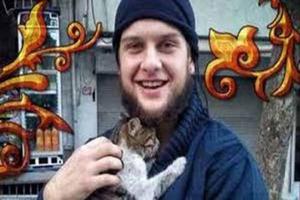SyriaFloridian is first known American suicide bomber in Syria
Floridian resident Moner Mohammad Abusalha is the first known American suicide bomber in Syria’s civil war. His death last May came as a surprise to U.S. counterterrorism agencies, which had lost track of him once he entered Syria. Some 12,000 foreign fighters have so far taken part in the Syria civil war — 3,000 of them from Western countries — and the inability to track these foreign fighters reflects a troubling blind spot for Western intelligence agencies. U.S. intelligence services are further hampered by legal restrictions which limit the monitoring of U.S. citizens and their communications.

U.S.-born suicide bomber Abusahla // Source: bacaytruc.com
Floridian resident Moner Mohammad Abusalha is the first known American suicide bomber in Syria’s civil war. His death last May came as a shock to his family, who believed he was in Jordan, his father’s ancestral homeland,- and American counterterrorism agencies, which had lost track of him once he entered Syria. Months prior to the suicide bombing, Abusalha sent e-mails to his family and friends indicating he was in Jordan. “I’m here now, doing fine….I’m here for a good cause, doing good things.”
U.S. officials were unaware of Abusalha’s activity level with Jabhat al-Nusra, an al-Qaeda backed rebel group, until he appeared last week in an online martyrdom video. The inability to track individual foreign fighters in Syria reflects a troubling blind spot for Western intelligence agencies tasked with monitoring the flow of foreign fighters into and out of Syria’s civil war.
“It’s a bit of a black hole,” one U.S. counterterrorism official said. “We don’t have a lot of collection there.”
The Washington Post reports that the CIA pulled its operatives out of Syria when the U.S. embassy closed as the conflict escalated. Legal restrictions also limit the monitoring of U.S. citizens and their communications.
With recent estimates that as many as 12,000 foreign fighters have so far taken part in the Syrian civil war — 3,000 of them from Western countries — U.S. intelligence agencies are worried that radicalized fighters may return home to launch terror attacks. Director of National Intelligence James Clapper recently testified that Jabhat al-Nusra has “aspirations for attacks on the homeland” and that al-Qaeda-backed groups have established camps “to train people to go back to their countries.”
Some U.S. counterterrorism officials, however, are relieved that Abusalha, a U.S. citizen and willing suicide bomber, had carried out the attack outside the United States, evidence that Jabhat al-Nusra remains focused on fighting Syrian troops rather than using an American recruit to launch an attack on the West.
Roughly a dozen Americans who have traveled to Syria and returned home since the civil war began have been investigated or carefully scrutinized by law enforcement officials. U.S. officials admit that Abusalha’s transformation into a willing suicide bomber might have eluded their intelligence even if they were able to spot an attempt to return to the United States. Abusalha was not suspected to have any hatred toward the United States, and his family and friends remembered him to be focused and positive. “He was really, really happy . . . always smiling,” said Cecilio Moreno, a Port St. Lucie resident, who attended a Fort Pierce Islamic center with Abusalha.
“It’s a game-changer,” said Martin Reardon, a former FBI counterterrorism official. “It drives home the threat of foreign fighters. What happens when they go home?”
Prior to his suicide attack, Abusalha was known to post on social networking sites clues reflecting his evolving beliefs. Images loaded to his Facebook account in 2012 and 2013 showed green birds, a motif associated with Islamist martyrs, according to the SITE Intelligence Group.
